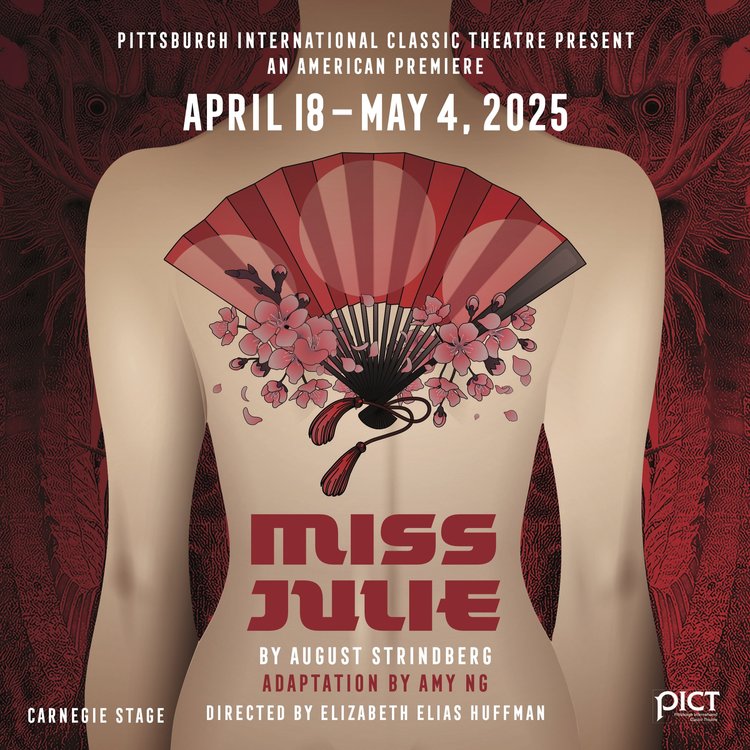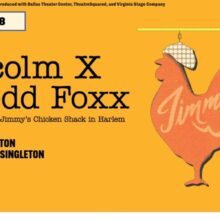
Spoilerish, reference to animal cruelty
Some of you are familiar with the play Miss Julie from traditional interpretations of August Strindberg’s 1888 play. Others may remember the storyline in the television show The Marvelous Mrs. Maisel where character actor Sophie Lenon decides to stage an ultimately disastrous version. The latter is how I first encountered Miss Julie.
Thus, when I saw that Pittsburgh International Classic Theater (PICT) was staging an adaptation by Amy Ng set in post-WWII Hong Kong, I was intrigued. My dismissal of the late 19th century musings of a white man about women’s social and economic boundaries may have been premature. My interest in an adaptation by a British-Hong Kong female playwright was piqued.
Traditionally, the play has three characters: upperclass Miss Julie with two servants, Jean,her father’s groom/manservant and a cook named Kristine. Miss Julie’s father is present in the narrative, but never on stage. It is set in Sweden in 1888.
Amy Ng reframes these three characters in this tumultuous era with Miss Julie still privileged daughter of British parents, but immersed in Hong Kong culture as much as social strictures allow. John is her father’s groom/manservant and Christine is the cook. Ng adds a fourth character, Auntie – floating across the stage, a ghostly figure of a beloved servant who died in the recent past. Auntie loved both Julie and Christine.
Everything happens in less than 24 hours as Hong Kong celebrates Chinese New Year. There are parades, fireworks, and frivolity. Miss Julie is juggling her desire to participate with domestic issues – her family dog has been impregnated by a neighboring dog of a Chinese family. Her father perceives this as a violation of racial norms and the dog and its pups must not be permitted to live. Christine is preparing the abortifacient and the euthanasia she knows will be necessary to spare the animal unnecessary suffering. Miss Julie frets. Christine solves problems.
Julie (Shelby Garrett) is distraught, but unable to defy her father, a British governor struggling to maintain control as Communist China targets Hong Kong. Julie gets distraught quite often, she is a walking example of 20th century trauma – her unhappy mother died when she was young, but not before she and Julie were interred in a Japanese camp during the War. Her father’s absence. Her conflicting identity with her British nationalism, her mother’s American values, and her own experience as a Hong Kong born young woman. Julie’s role models for adult women are the memories of her mother and Auntie. And Christine.
John (Trieu Tran) infuses the traditional character Jean with ambition, lust, and a love/hate relationship with his own culture as well as the overlords who employ him. He wants more from life, not a return to the traditions of poverty and squalor. He’s a new generation of a new Hong Kong, determined to claim his future at the expense of everyone. He is the survivor. It is not lost on me how John’s gender also informs his choices.
Christine (Yan Pang) has a more fleshed out role. She has embraced the Christianity of the British, but remains deeply connected to her culture – in her cooking, her knowledge of herbs, her embrace of a gorgeous silk dress in a modern style, and her ties to the deceased Auntie as a servant. Auntie (Mimi Jong) is both a traditional house servant but part of a uniquely Chinese role for women who remain celibate and use communal funds to survive. There is an expectation that is the future for Christine. She dreams of a modern marriage with John. She remains loyal to Julie.
Neighborhoods are on fire. Nouveau riche Hong Kong residents challenge British norms by building homes that block their views. Miscegenation remains a British value even for dog and despite the pain for everyone. Julie’s mother found fulfillment as a medical missionary, even in the midst of the worst conditions in the camps. Julie has no such passion, watching her father stifle it out of her mother until her death. All she wants is love.
There’s sex, lots of alcohol, long diatribes about class and race, The three leads ping pong from one extreme to another until John, then Christine make their choices. And there is Julie who faces the only choice she feels possible.
Oh, but there is Auntie. The ambiguous ending is very important because Julie having a choice is more important than what choice she makes.
The set is lovely, mainly centered in the kitchen with a door that leads to dragon costumes and forgiveness and steps that lead up into the upper lip of stiff British culture. The three characters move around from table to seat to the stove and back again like a folklore dance that is supposed to have a predictable outcome.
Trieu Tran is amazing as John. Tran was born in Vietnam and raised in Boston. He was a convincing young man struggling between ambition and the pull of his traditional culture. He had no qualms about sleeping with two women in the course of the same day. John was buzzing with impatient desire to start living his own life even as he repeatedly slid back into the dutiful servant role when necessary. He was the voice of reason, acknowledging how the past and future were colliding. John is our narrator to the political chaos sweeping through Hong Kong China while Kristine wove the cultural traditions against a new world order.
After the performance, the playwright Amy Ng was part of a talk back dialogue. I was decompressing from my anxiety so I didn’t ask a question that came to mind – how would she conceive this play in Pittsburgh in the modern era, given Pittsburgh’s racial diversity and divides? Or setting the story in the midst of the ongoing dynamics between Palestine and Israel, perhaps also set in Pittsburgh?
I did learn there are many adaptations of this play, including one by Pittsburgh’s own Mark Clayton Southers set at a Reconstruction-era Virginia plantation. In what I think is a terrific idea, PICT and Pittsburgh Playwrights are hosting a joint fundraiser on Wednesday with a screening of the Southers production. I wish I could go – Ng’s adaptation makes me curious about all others and I’ve added several to my screening lists.
One thing I love about theater in Pittsburgh is when the companies mix it up with new intersectional approaches to classic. I love the new productions, I love (some of the) classics, but I really enjoy a unique visit back to a strong classic tale. PICT did not fail me in this regard. I have an entirely new appreciation for the original and a lot more curiosity about post-War Hong Kong.
When I leave a play furiously Googling all of the things that captivated me – from the setting to the legacy of the Aunties to the demise of the British Empire – I feel a special kind of invigoration.
Miss Julie continues through May 4, 2025 at Carnegie Stage. This play along with Witch from earlier in the season reminds me how important Carnegie Stage is to the local arts scene.




